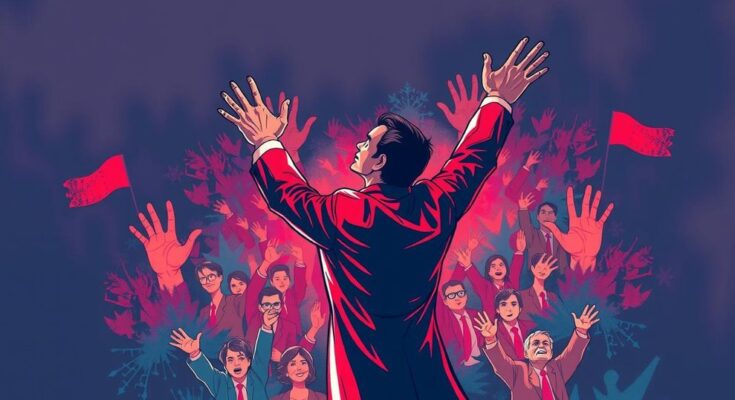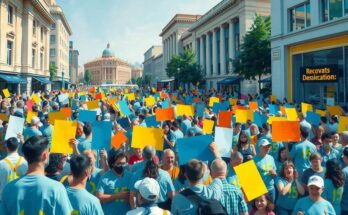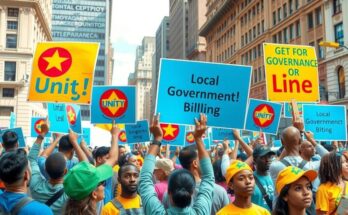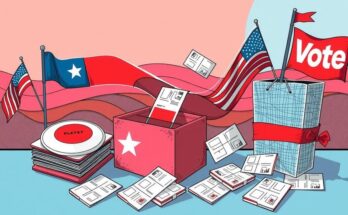Argentine President Javier Milei has vowed to imprison individuals instigating violence during protests, following a protest by pensioners that led to clashes with police. His comments emphasize a commitment to maintaining order, while National Security Minister Patricia Bullrich faces scrutiny. Amid internal party tensions regarding the handling of the protests, Milei has canceled a planned trip to Spain, choosing instead to visit Israel.
On Friday, President Javier Milei declared that individuals who instigate violence during protests will be prosecuted and imprisoned. His comments came after clashes during a demonstration by pensioners, which involved football fans and resulted in 124 arrests and 45 injuries. At the Expoagro agricultural event in Buenos Aires Province, he emphasized that, “The good ones are the ones in blue [the police] and the sons of bitches who go around with rags on their faces and break cars, burn cars and threaten people.”
Milei affirmed his administration’s commitment to “defending the republic,” while standing beside National Security Minister Patricia Bullrich, who has faced significant criticism for her handling of the protests. She has been accused of misrepresenting events and has challenged a judge for releasing over 90 individuals detained during the protests. The incident escalated when a photographer, Pablo Grillo, sustained serious injuries from a police-issued pepper spray canister, prompting further scrutiny of Bullrich’s conduct.
The pensioners’ demonstration, which called for improved pensions, was bolstered by supporters from 30 football clubs as well as various political and social organizations. Initially sparked by an incident involving a retiree wearing a Chacarita Juniors shirt, tensions reached a climax when protesters encountered aggressive police measures, including rubber bullets and tear gas. While most attendees protested peacefully, some resorted to violence, leading Bullrich’s ministry to file severe charges against them, including “sedition” and “aggravated illicit association.”
Judge Karina Andrade has defended her decision to release detained protesters, stating that the arrests were not documented adequately. Nonetheless, Bullrich asserted the presence of various groups aiming to destabilize the government following the protest, which some of Milei’s allies have labeled as an attempted coup.
Tensions within Milei’s party, La Libertad Avanza, are evident as Vice-President Victoria Villarruel expressed sympathy for the injuries sustained by both protestors and police. She emphasized that the unrest was part of democratic expression, though she condemned violence by any party. Villarruel’s remarks highlight ongoing divisions within the administration regarding the protest response.
In light of this escalation, President Milei has canceled his planned trip to Spain. Originally scheduled to depart on March 20, he will instead travel to Israel on March 28, making it his second visit to the country as president. The Fundación Club de los Viernes, responsible for inviting him to Spain, announced this postponement, incorrectly citing a coup attempt as the reason for the cancellation of his European leg of the trip.
President Javier Milei’s strong stance against protest-related violence clearly outlines his intention to take decisive action against those perceived as instigators. The situation has resulted in significant discord within his party, particularly regarding the approach to managing protests. Moreover, tensions surrounding protests reflect broader issues of governance and civil rights in Argentina, as Milei reduces his international engagements amidst domestic unrest. This serves as a crucial point in understanding the shifting landscape of political discourse in the country.
Original Source: www.batimes.com.ar




